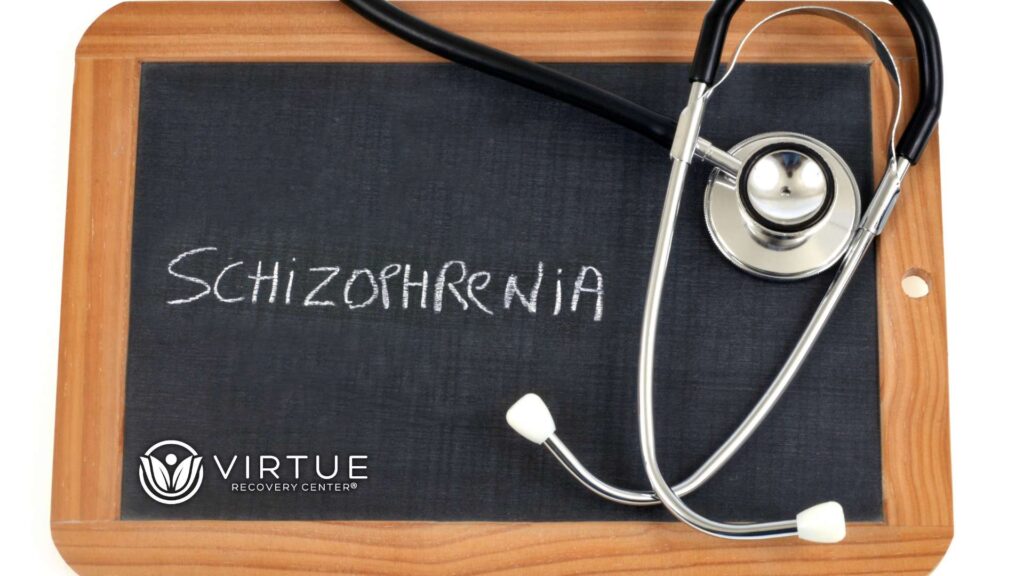Key Takeaways
- Schizophrenia and substance use disorder (SUD) frequently occur together, creating unique challenges for individuals and caregivers.
- Substance use, such as cannabis or alcohol, often worsens schizophrenia symptoms and complicates treatment.
- Recovery is possible with integrated care that addresses both conditions simultaneously.
Introduction
Schizophrenia is a severe mental health condition that impacts how a person thinks, feels, and acts. Common symptoms include hallucinations, delusions, and disorganized thinking, making daily life a challenge.
When combined with substance use disorder, the situation becomes even more complex. Many people with schizophrenia use substances like cannabis or alcohol to cope with their symptoms. Unfortunately, this often makes their condition worse.
Understanding the link between schizophrenia and addiction is crucial. With the proper treatment and support, individuals can recover and lead fulfilling lives.
What Is Schizophrenia?
Schizophrenia is a long-term mental health disorder that affects how a person interprets reality. It typically involves positive symptoms, such as hallucinations or delusions, and negative symptoms, like reduced emotional expression or social withdrawal. Cognitive challenges, including difficulty focusing and remembering, are also common.
This condition usually develops in early adulthood and can severely disrupt daily life. Relationships, work, and self-care often become challenging without proper treatment. While schizophrenia is a lifelong illness, medications and therapy can help manage symptoms effectively.
The Link Between Schizophrenia and Substance Use Disorder
People with schizophrenia are significantly more likely to develop substance use disorders compared to the general population. This connection arises from a combination of factors.
Many individuals use substances as a way to cope with distressing schizophrenia symptoms. Drugs like cannabis and alcohol may provide temporary relief but often worsen mental health over time. Additionally, substances like cannabis have been linked to triggering psychotic episodes in vulnerable individuals, especially those with a genetic predisposition.
Social factors, such as isolation, stigma, and unemployment, also contribute to substance use. For many, substances become a way to manage stress or escape difficult emotions.
Challenges of Co-Occurring Schizophrenia and Addiction
Living with both schizophrenia and addiction presents numerous challenges. Diagnosing schizophrenia in someone with substance use disorder is often complicated, as substance use can mask or mimic its symptoms.
Treatment becomes more complicated when substances interfere with medications prescribed for schizophrenia. For instance, alcohol or cannabis may reduce the effectiveness of antipsychotic drugs, leading to worse outcomes. This dual diagnosis also increases the risk of homelessness, incarceration, and poor physical health, making a coordinated treatment approach essential.
Treatment Options for Schizophrenia and Substance Use Disorder
Effective care for individuals with schizophrenia and addiction involves treating both conditions simultaneously.
Medication is a cornerstone of treatment. Antipsychotic drugs help manage schizophrenia symptoms, while medications like naltrexone or buprenorphine may address addiction. Therapy is equally important. Cognitive-behavioral therapy (CBT) helps patients develop healthier thought patterns, while motivational interviewing encourages recovery by exploring personal goals and values.
Support programs like dual-diagnosis groups provide a sense of community and shared understanding. Comprehensive rehabilitation programs also offer life-skills training, helping individuals regain independence and stability.
Supporting Individuals With Schizophrenia and Addiction
Family members and caregivers can play a vital role in recovery. Offering patience and understanding is essential, as the journey to wellness can be long and challenging. Educating yourself about schizophrenia and addiction can also help you provide informed support.
Encourage your loved one to seek professional treatment and be involved in their care. Attending therapy sessions together or helping them manage appointments shows your commitment to their recovery. Creating a stable, stress-free environment at home can also make a big difference in their progress.
Conclusion
Schizophrenia and substance use disorder often go hand in hand, creating significant challenges for those affected. These co-occurring conditions require integrated care that addresses both mental health and addiction. Proper treatment and support make recovery possible, allowing individuals to lead healthier and more fulfilling lives.
If you or someone you know is struggling with schizophrenia and addiction, help is available. Call Virtue Recovery Killeen at 855-788-5582 for compassionate, professional care tailored to your needs.
FAQs
What Is Schizophrenia?
Schizophrenia is a chronic mental health disorder that affects how a person thinks, feels, and behaves.
Why Do People With Schizophrenia Often Have Substance Use Disorders?
Many use substances to cope with symptoms, but genetics, stress, and environmental factors also play a role.
What Substances Are Commonly Used by Individuals With Schizophrenia?
Cannabis, nicotine, alcohol, and stimulants are frequently used, often worsening schizophrenia symptoms.
How Are Co-Occurring Schizophrenia and Substance Use Treated?
Treatment involves antipsychotic medications, addiction therapies, and comprehensive rehabilitation programs.
How Can Families Support a Loved One With Schizophrenia and Addiction?
Families can offer patience, understanding, and encouragement for seeking professional treatment.
What Are The Symptoms of Schizophrenia?
Symptoms of schizophrenia include hallucinations, delusions, disorganized thinking, lack of motivation, and social withdrawal, often impairing daily functioning and relationships.
What Are The Risk Factors For Schizophrenia and Substance Abuse?
Risk factors include genetic predisposition, exposure to trauma or stress, a family history of mental illness, and self-medication behaviors to cope with schizophrenia symptoms.
What Are Some Therapy Options For The Treatment For Schizophrenia?
Therapy options include cognitive-behavioral therapy (CBT), social skills training, family therapy, and supportive psychotherapy to help manage symptoms and improve functioning.
What Are The Modalities of Treatment For Substance Use in Schizophrenia?
Treatment modalities include integrated dual diagnosis programs, medication-assisted treatment (MAT), individual and group therapy, and behavioral interventions tailored to both conditions.
Resources
https://www.webmd.com/schizophrenia/schizophrenia-substance-use-disorder
https://pmc.ncbi.nlm.nih.gov/articles/PMC6094954/
https://www.sciencedirect.com/science/article/abs/pii/S2468171723000078
- About the Author
- Latest Posts
Gigi Price holds licenses as a Master Social Worker and Clinical Drug Counselor. She completed her master’s degree in Social Work at Texas State University. Over the last decade, Gigi has been dedicated to utilizing evidence-based practices to enhance patient care and treatment planning, resulting in positive, long-term outcomes for patients and their families. Her passion lies in creating a treatment environment where professionals collaborate to bring about positive change and provide a safe, trustworthy therapeutic experience. Patients can be confident in receiving top-quality care under her leadership.
In her role as the Clinical Director of Virtue Recovery Houston, Gigi conducted research to identify the most effective approaches for treating patients with acute mental health diagnoses, PTSD, and Substance Use Disorder. She then assembled a team of skilled clinicians who could offer various therapeutic modalities, such as Cognitive Behavioral Therapy (CBT), Dialectical Behavioral Therapy
(DBT), Acceptance and Commitment Therapy (ACT), Somatic Exposure, Eye Movement Desensitization and Reprocessing (EMDR), and Cognitive Processing Therapy (CPT). Gigi takes pride in overseeing the development and implementation of Virtue Houston’s Treatment Program, which includes two specialized therapeutic curricula tailored to the unique needs of individuals struggling with mental health issues, addiction, and PTSD.









